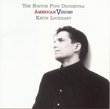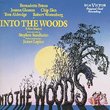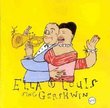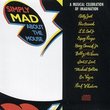| All Artists: Takuo Yuasa Title: MacDowell: Suites Nos. 1 & 2, Hamlet & Ophelia / Ulster Orchestra, Yuasa Members Wishing: 0 Total Copies: 0 Label: Naxos American Release Date: 2/20/2001 Genre: Classical Styles: Forms & Genres, Symphonies, Theatrical, Incidental & Program Music, Symphonies Number of Discs: 1 SwapaCD Credits: 1 UPC: 636943907528 |
Search - Takuo Yuasa :: MacDowell: Suites Nos. 1 & 2, Hamlet & Ophelia / Ulster Orchestra, Yuasa
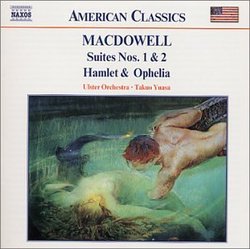 | Takuo Yuasa MacDowell: Suites Nos. 1 & 2, Hamlet & Ophelia / Ulster Orchestra, Yuasa Genre: Classical
What's this? An Irish orchestra and a Japanese conductor doing the music of Edward MacDowell, the German-trained, American-born 19th-century composer of Scottish descent? Well, when Americans don't get behind one of the mo... more » |
Larger Image |
CD DetailsSynopsis
Amazon.com What's this? An Irish orchestra and a Japanese conductor doing the music of Edward MacDowell, the German-trained, American-born 19th-century composer of Scottish descent? Well, when Americans don't get behind one of the most formidably talented of their native sons--he was, after all, our country's greatest Romantic--things like that can happen. Not that this attention from foreign quarters isn't welcome. Naxos and its sister label, Marco Polo, have done very well by MacDowell over the years, releasing a wonderful four-CD overview of his solo piano music by the late, greatly lamented James Barbagallo, and also embarking on a survey of his orchestral works. This installment in the series features the Ulster Orchestra in spirited and smartly played accounts of Suites Nos. 1 and 2, MacDowell's most substantial symphonic works. It follows hard on the heels of a brilliant recording of the piano concertos from pianist Stephen Prutsman and the Dublin-based National Symphony Orchestra of Ireland, conducted by Arthur Fagen. Marvelous as the performances of the suites are--and they're well recorded, to boot--the filler, a reading of the symphonic poem Hamlet and Ophelia, comes as a letdown. Here, Yuasa and his Ulster charges are in competition with the vintage stereo recording by Karl Krueger and the Royal Philharmonic, reissued by Bridge in 1999. While Krueger's account gives the score a truly Lisztian weight and points up its indebtedness to Tchaikovsky's Francesca da Rimini, Yuasa, breezing through the piece in 13:21 (compared to Kreuger's 17:20), allows it to seem a bit like the work of an American Glazunov. Pity. --Ted Libbey Similarly Requested CDs
|
CD ReviewsEdward MacDowell: American Music with a German Flavor 01/03/2002 (4 out of 5 stars) "There are several reasons why this CD represents a useful addition to the catalog. First, the "First Suite" is not otherwise available on disc, and while it is not earthshaking, it is a pleasant and competent late-Romantic piece. Second, the "Second Suite" is not available in modern digital sound, and it should be. Third, "Hamlet and Ophelia" shows the literary MacDowell at his (again, less than earthshaking) best, and this a side of the composer we don't often hear.The "First Suite" as elements of the fairytale about it, especially in its first ("In a Haunted Forest") and last ("Forest Spirits") movements. The notes to the recording speak of the Mendelssohnian quality of the latter movement, but really MacDowell has a heavier hand about him, and despite delicate touches, the suite sounds more like Wagner and Liszt than Mendelssohn--typical MacDowell, that is. Pleasant though the suite is, it could just as easily have been penned by the likes of Raff, Goetz, Joachim, or Bruch (on a bad day) as by the American composer.The "Second Suite," once highly popular, is meatier and sticks in the mind better. It purports to portray what MacDowell called "the manly free rudeness of the American Indian," though like Dvorak's "American" music, MacDowell's has as much of the Old World about it as the New. Here, that's not such a bad thing, as the level-headed German approach keeps the "Dirge" from sounding maudlin, as it might, and gives heft and profile to the "Legend" and "Village Festival," where the presumably authentic Indian melodies aren't as catchy as MacDowell hoped they'd be. Still, the suite is a fair piece of music and worth hearing whether you're a MacDowell fan or not."Hamlet and Ophelia" is interesting because it represents one aspect of MacDowell that isn't widely explored on disc or in performance. The piece started life as two separate character studies that the composer later pieced together. In this form, the work sounds like a minature character symphony a la Liszt's "Faust Symphony." MacDowell's Hamlet is a brash and daring fellow with a tender side, so his music is dramatic, a bit pompous. Ophelia's is about what you would expect--sweetly melancholy. "Hamlet and Ophelia" is a good Germanic tone poem as it stands, but since the ending to Ophelia's section is a quiet one, the piece almost cries out for a more dramatic close. If MacDowell were still around, I'd suggest he take a lesson from his friend Liszt and add a third section on Hamlet's antigonist Claudius, of course tossing in the final swordplay from "Hamlet" for thrills. Maybe even a choral apotheosis of Hamlet, a la Liszt.... But MacDowell isn't around, and probably the whole enterprise would sink of its own weight. So what we have of "Hamlet and Ophelia" will have to do, and it does its job well.So do Takuo Yuasa and the Ulster Orchestra, an unlikely pair, especially in such German-American fare as this. But Yuasa's sense of drama keeps the music very much alive and, in the case of the "First Suite," even makes it seem better than it is. The players are with him every step of the way, and the recording is quite fine. I recommend this disc." Some really great music Brian M. Dempsey | 08/11/2008 (5 out of 5 stars) "There is a tendency to put down the music of Edward MacDowell. The reason for this is partly historical. Throughout the early and middle part of the Twentieth Century, American musicologists and educators spent a lot of time discussing what represented "Americanism" in music. After a lot of fuss, the experts decided that jazz music sounded American and represented a truly national musical style.
That argument probably made some sense until rock-n-roll completely displaced jazz as the musical style of choice among ordinary Americans. That happened sometime in the 1950's and 1960's. Jazz has never recovered the foothold that it once held, and nowadays, jazz performers are about as hip as their symphonic musical colleagues. The difficulty of trying to discover a national musical art form in America is that the culture is too large and the population is too diverse. Grieg, Dvorak, and Sibelius may represent truly nationalistic composers from their small, homogenous countries. Unfortunately, the United States, a place made up of almost every nationality on the planet, has many sub-cultures. Punk, hip-hop, rock, country, folk, and Broadway are all quintessential "American" styles. For that matter, so are Wagner and Puccini, since the U.S. has a sizeable population of Germans and Italians. The point is that it is ludicrous to put down MacDowell because he does not sound "American" enough when we cannot even determine what sounds distinctively "American." MacDowell, of Scotch-Irish heritage, studied in Germany. Well, what of it? Virtually every 19th Century musician wanted to study there since Germany represented the musical nation par excellence. Yet MacDowell does not truly sound German. It is, in fact, unlikely that any German could have or would have written the "Indian" Suite. MacDowell's music sounds "American" in the way that Elgar's sounds "British." It is indefinable when you look at chords and charts yet distinctive when you listen to the rugged quality of the music. My advice to music lovers is to just listen to this music. MacDowell was a melodist of the same rank as Schubert and Tchaikovsky. The "Indian" Suite contains some beautiful, moving moments as well as some terrifying ones. MacDowell seems to understand the tragedy of Native Peoples in the Americas. The melodies will move you if you let them. Admittedly, the other works are not as good because they represent MacDowell in a formative period, but the "Indian" Suite is worth ten times the cost of this recording. " |

 Track Listings (11) - Disc #1
Track Listings (11) - Disc #1